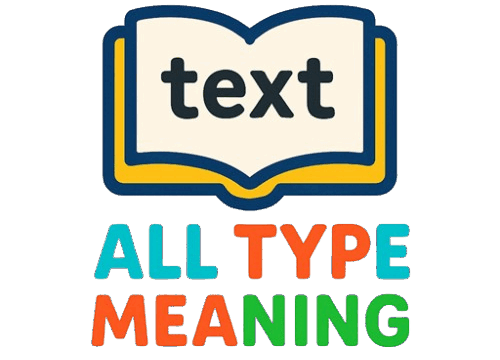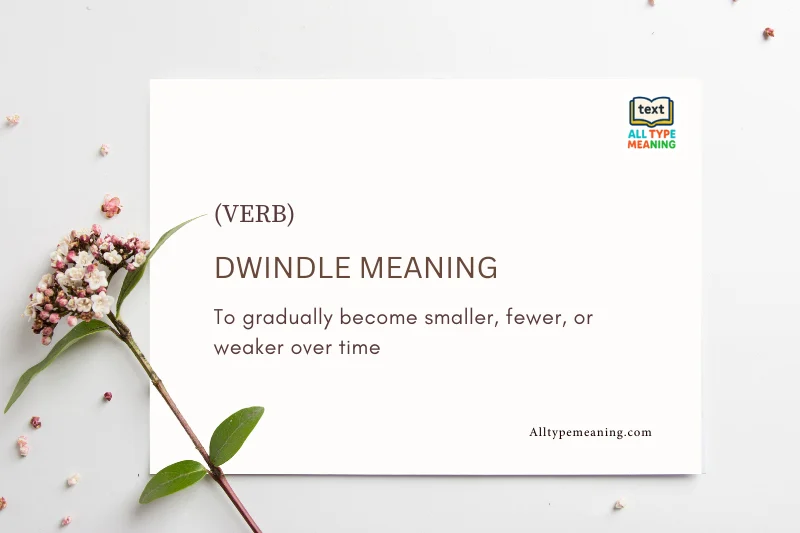Have you ever wondered about the dwindle meaning and how to use this powerful word correctly? Whether you’re a student preparing for exams, a writer looking to enhance your vocabulary, or simply someone curious about language, understanding what “dwindle” means can significantly improve your communication skills. This comprehensive guide will explore every aspect of the word “dwindle,” from its basic definition to advanced usage examples.
The word “dwindle” appears frequently in literature, news articles, and everyday conversations. By mastering its meaning and proper usage, you’ll be able to express ideas about decrease, reduction, and gradual decline with precision and clarity. Let’s dive deep into this fascinating word and unlock its full potential! ✨
What Does Dwindle Mean? Basic Definition
Dwindle is a verb that means to gradually become smaller, fewer, or less in amount, size, or intensity. When something dwindles, it doesn’t disappear suddenly – instead, it slowly decreases over time until it becomes much smaller than it originally was.
Key Characteristics of Dwindle:
- Gradual process – not sudden or immediate
- Continuous decline – keeps getting smaller over time
- Natural reduction – often happens without force
- Measurable decrease – you can observe the change
| Aspect | Details |
|---|---|
| Part of Speech | Verb (intransitive) |
| Pronunciation | /ˈdwɪndəl/ |
| Origin | Old English “dwinan” (to waste away) |
| Synonyms | Decrease, diminish, shrink, decline |
| Antonyms | Increase, grow, expand, multiply |
The dwindle definition becomes clearer when you think about things like savings accounts that slowly lose money, crowds that gradually disperse, or daylight that slowly fades as evening approaches. These are perfect examples of the dwindling process in action! 🌅
Different Forms and Variations of Dwindle
Understanding the dwindle meaning and how “dwindle” changes in different grammatical contexts helps you use it correctly in various situations. Let’s explore the different forms:
Present Tense Forms:
- Dwindle (base form): “Resources dwindle during emergencies”
- Dwindles (third person singular): “The population dwindles each year”
- Dwindling (present participle): “We’re seeing dwindling support for the project”
Past Tense Forms:
- Dwindled (simple past): “The company’s profits dwindled last quarter”
- Had dwindled (past perfect): “By winter, their food supplies had dwindled”
Common Spelling Variations:
While “dwindle” is the correct spelling, you might occasionally see “dwendle” in informal writing or typos. However, remember that “dwindle” is always the proper spelling! ⚠️
The word “dwindling” is particularly useful as both an adjective and a verb form. For example: “The dwindling crowd showed decreasing interest in the speaker’s message.” 👥
Real-Life Examples and Usage
To truly understand dwindle meaning, let’s explore how this word appears in various contexts. These examples will help you recognize and use “dwindle” naturally in your own writing and speaking.
Business and Economics 💼
- “The company’s market share began to dwindle after the new competitor entered the market”
- “Sales dwindled from $1 million to $300,000 over six months”
- “Their customer base has been dwindling due to poor service quality”
Nature and Environment 🌱
- “The forest area dwindles by thousands of acres each year due to deforestation”
- “Water levels in the reservoir dwindled during the drought”
- “The bee population continues to dwindle, affecting pollination”
Personal Life and Relationships 💝
- “His enthusiasm for the hobby dwindled over time”
- “Their friendship dwindled after they moved to different cities”
- “Her energy dwindles as the day progresses”
Academic and Educational Contexts 📚
- “Student attendance dwindles toward the end of the semester”
- “Interest in the subject dwindled after the difficult exam”
- “The library’s book budget has dwindled over recent years”
Time and Resources ⏰
- “Daylight dwindles as winter approaches”
- “Our savings dwindled during the extended vacation”
- “Time dwindles as the deadline approaches”
These examples show how versatile the word “dwindle” can be across different situations and contexts! 🎨
Common Mistakes and How to Avoid Them
Even though the Dwindle Meaning seems simple, people often make mistakes when using this word. Let’s look at common errors and learn how to avoid them:
Mistake #1: Using “Dwindle” Transitively
Wrong: “The drought dwindled the water supply” ❌ Correct: “The water supply dwindled due to the drought” ✅
Explanation: “Dwindle” is an intransitive verb, meaning it doesn’t take a direct object. Things dwindle by themselves – they aren’t “dwindled” by something else.
Mistake #2: Confusing with “Swindle”
Wrong: “He tried to dwindle money from tourists” ❌ Correct: “He tried to swindle money from tourists” ✅
Explanation: “Swindle” means to cheat or defraud, while “dwindle” means to decrease gradually. These are completely different words!
Mistake #3: Spelling Errors
Wrong: “The crowd started to dwendle away” ❌ Correct: “The crowd started to dwindle away” ✅
Explanation: Remember the correct spelling is D-W-I-N-D-L-E, not “dwendle.”
Mistake #4: Using in Wrong Context for Sudden Changes
Wrong: “The building dwindled when the earthquake hit” ❌ Correct: “The building collapsed when the earthquake hit” ✅
Explanation: “Dwindle” implies a gradual process, not sudden destruction or change.
Pro Tips for Correct Usage: 💡
- Always remember: things dwindle away, they aren’t dwindled by something
- Use “dwindle” for gradual, ongoing processes
- Pair with time expressions like “over time,” “gradually,” or “slowly”
- Consider synonyms like “decrease” or “diminish” if you’re unsure
Conclusion:
Understanding dwindle meaning opens up new possibilities for expressing gradual decrease and reduction in your writing and speaking. This versatile word captures the essence of slow, natural decline that happens in countless situations – from business scenarios to personal experiences.
Remember the key points:
- Dwindle means gradual decrease over time ⏰
- It’s an intransitive verb (things dwindle by themselves) 📝
- Perfect for describing natural, ongoing reductions 🌿
- Different from sudden changes or decreases ⚡
For more interesting word insights, don’t miss our article on Lumon Meaning for a deeper dive into another unique term.
Frequently Asked Questions
1. What is the exact dwindle meaning in simple terms?
A: Dwindle means to gradually become smaller, fewer, or less over time. Think of ice melting slowly in the sun or a crowd slowly leaving after an event ends. It’s always a slow, steady decrease rather than a sudden change! 🧊➡️💧
2. Can you use “dwindle” for sudden decreases?
A: No, “dwindle” specifically refers to gradual decreases that happen slowly over time. For sudden changes, use words like “plummet,” “crash,” “collapse,” or “drop suddenly.” The key characteristic of dwindling is that it happens bit by bit! ⏳
3. What’s the difference between “dwindle” and “diminish”?
A: Both words mean “to become smaller,” but “dwindle” often implies becoming very small or nearly disappearing, while “diminish” can refer to any degree of reduction. “Dwindle” also tends to suggest a more natural, ongoing process. For example: “The fire diminished when we added less wood” vs. “The fire dwindled until only embers remained.” 🔥
4. Is “dwindled” the correct past tense of dwindle?
A: Yes! “Dwindled” is the correct past tense form of “dwindle.” Examples: “The crowd dwindled as the evening grew late” or “Their savings had dwindled by the end of the month.” Remember, it follows regular verb conjugation patterns! ✅
5. Can I use “dwindle away” or just “dwindle”?
A: Both are correct! You can say “The crowd dwindles” or “The crowd dwindles away.” Adding “away” emphasizes the complete disappearance or near-disappearance of something. It’s like the difference between “The sound faded” and “The sound faded away” – both work, but “away” adds emphasis! 🎵
📚Visit Alltypemeaning.com for more comprehensive word guides and vocabulary building resources! 💡

